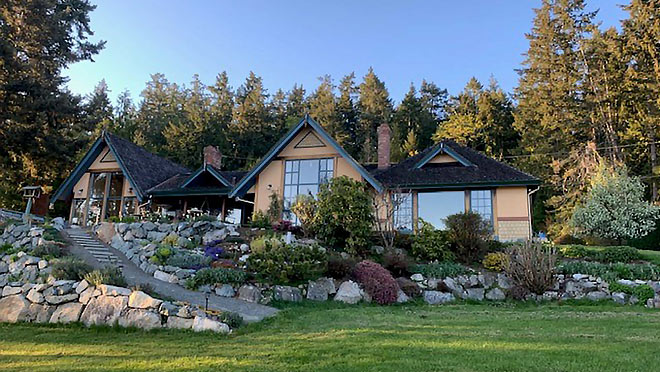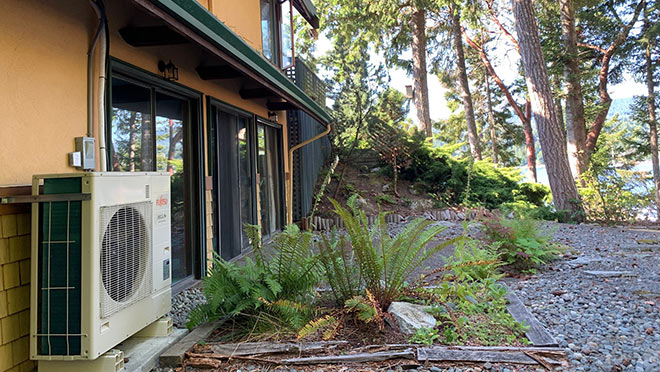Mill Bay couple stays cool in heat wave, thanks to heat pump

Homeowners surprised at heat pump's cooling ability and modest energy use
Note: The names of the homeowners in this story has been changed to protect their privacy.
"I remember telling the contractor that in our house, we open the windows, we let the air flow through, and we love the heat. I told him we probably won't use the heat pump for air conditioning. Was I ever wrong."
– Mill Bay homeowner Milan Popowich.
Like so many British Columbians who had learned to live comfortably through summer without any form of air conditioning, Milan Popowich got a wakeup call during late June's historic heat wave.
Fortunately, he had installed a heat pump – using a B.C. home renovation rebate to reduce the cost – last fall.
"We closed all the windows, closed the curtains, and we basically relied on the heat pump to keep the house cool," said Popowich. "And it did a very, very good job."
Popowich said he debated with his wife Annie about which temperature to set the heat pump at for cooling. She suggested 24°C, but he won out and set it to 26°C, which he said struck a great balance between efficiency and comfort.
"When you step outside and it's 36 or 38 degrees, coming inside to 26 degrees feels brilliant," he says. "There's always a bit of a compromise but you don't want to overload the system."
BC Hydro, which recommends setting cooling at a minimum of 25°C as part of a set-it-and-forget it strategy that's the key to efficiency, applauds that choice. Better yet, Popowich logged into his online BC Hydro account the next week and, using MyHydro's tracking tool, saw only modest increases in his electricity use. "I expected to see more of a spike there, and there wasn't," he says. "It actually didn't crank up our energy usage significantly."
Popowich made the switch to a heat pump after the electric furnace in his 4,700-square-foot home – a home initially built in 1992 but expanded through a 2004 renovation – started to show its age. The home's large south-facing windows are double-glazed, but are still susceptible to heat gain and loss, so after reading about the rebate, Popowich got three quotes from area contractors and settled on a local one, thanks to a word-of-mouth recommendation from a friend.
With the heat pump installed, from December 2020 through April 2021 Popowich cut his monthly bills by an average of 31% and saved more than $160 per month. With those savings, he figures the payback on the purchase and installation of the heat pump will be 10 to 12 years. And the comfort upgrades – especially this summer – have been immediate.
Rebates of up to $2,000 are available for eligible heat pumps under the Home Renovation Rebate program, delivered through a partnership between BC Hydro, FortisBC and CleanBC.

New heat pump is not like the old one
This wasn't Popowich's first go-round with a heat pump. He had one installed in a Victoria home in the 1980s. But with today's better technology and the competition spawned by the increased popularity of heat pumps, the experience of owning one has changed dramatically.
Popowich was extremely happy with the expertise and advice of his contractor, and he was taken aback at the difference in size between his old heat pump and the new one.
"It's so much smaller," he says. "My old one was this large, round circular thing, probably about three foot in diameter. I think the new one is probably just two and a half feet high and is very narrow, just a little rectangular unit. We had it installed in a place with good air flow, just a bit away from the side wall of the basement of the house. And it's exceptionally quiet."
Popowich said installation required minimal duct work, most work was done in a day, and the contractor showed up later to thoroughly clean up the area, including the landscaping around where the installation took place. After some initial trepidation – "Initially, when you do something like this, you worry about what might go wrong" – Popowich says the comfort and energy savings have him confident he made a great choice.
"I realize how fortunate we are that our timing worked out well in getting this before the heat wave, and secondly, that we could afford it," he says. "But I will say the BC Hydro rebate was a huge incentive."
Aside from the comfort and savings, Popowich says he and his wife Annie are environmentally conscious and aware that the choices of today could help make things better for their grandchildren down the road.
"I've got kids in their thirties who are super conscious about the environment, and their children are going to be the ones who are living in in the world in in the next 50 to 100 years," he says. "We haven't done a great job of sort of looking after the environment up until now, and I think that doing things like being more cost-effective and more energy efficient with electricity is a fantastic thing."
Consider a Program Registered Contractor for your heat pump installation
Heat pump and insulation Program Registered Contractors (PRC) have completed additional training so that they can provide the best service possible. Working with a PRC means you're working with someone trained in industry best practices and knowledgeable about rebates available for your upgrades. It's important to get the right kind of heat pump, and the right size of heat pump, for your particular home.
If you're considering using home renovation rebates to help with insulation upgrades, you'll now be required to use a Program Registered Contractor to qualify for the rebate.
Learn more about Program Registered Contractors and how to find one.
Learn more about heat pumps